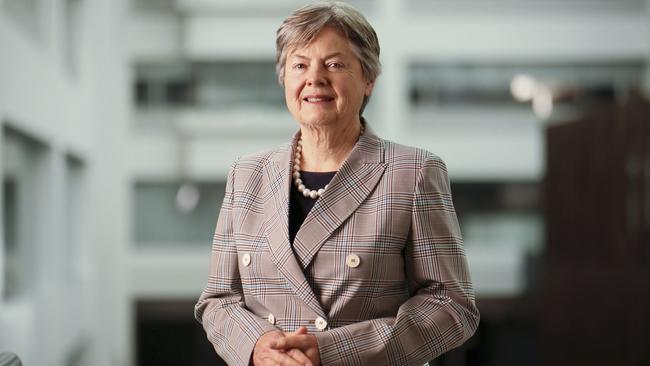Former Independent Commissioner Against Corruption Ann Vanstone KC criticises ministerial behaviour ‘confusion’ as she urges reforms
SA’s most senior political leaders should disclose association memberships as the anti-corruption watchdog warns urgent reform is needed.

SA News
Don't miss out on the headlines from SA News. Followed categories will be added to My News.
South Australia’s most senior political leaders should disclose sporting, trade unions or other association memberships amid urgent need to reform official behaviour rules, the anti-corruption watchdog warns.
In her final public statement, former Independent Commissioner Against Corruption Ann Vanstone KC urged an overhaul to rules protecting taxpayers from Cabinet “conflict”.
Premier Peter Malinauskas ordered a review of the current ministerial code of conduct, the first in 20 years, just weeks after his landslide election win in March 2022.
A new code, based on Crown law advice and a Department of Premier and Cabinet review, were expected to be published late last year after the Vicki Chapman row.
But in a surprise intervention, Ms Vanstone noted it “is yet to be completed” more than 2.5 years later.
Warning current rules attracted “significant confusion”, she noted “part of the reason for the delay has been difficulty in satisfactorily defining a conflict of interest”.

It is understood she agreed to provide DPC chief executive Damien Walker with advice for his review, which she quietly published online.
Senior government sources also questioned the delays.
“One wonders how long a review into a conflict of interests policy can take a government,” they said.
In her nine-page report, Ms Vanstone urged reforms including “no general exclusions for memberships of sporting groups, trade unions or other associations”.
“Because the nature of private interests can vary greatly, (rules) should not provide general exceptions (which) can be confusing,” she wrote.

Ms Vanstone, the second ICAC who finished last Friday, wrote it was important to have official rules that deal with a “clash of competing interests”.
She warned it was not in the community’s interests for a minister to recuse themselves from a decision “out of excessive caution or the fear of being unfairly criticised”.
Under state law, ministers must disclose any personal or financial “conflict” with Cabinet decisions and notify authorities of parliamentary register details.
But Ms Vanstone, a former Supreme Court justice who abruptly quit in July four years into her seven-year term, urged nine reforms including changing “vague” definitions, tightening disclosure requirements and developing better education.
She said new rules “must be clear and accessible and leave little room for confusion or argument”.
“It protects against both the misuse of power and the perception of misuse, maintaining the integrity of public administration and the confidence the community places in it,” she wrote.
“There is little use in requiring ministers to disclose a conflicting interest if what needs to be disclosed is vague, colourable or difficult to interpret.
“They should not recuse themselves on a flimsy basis … acting out of excessive caution or fear of political repercussions.”
An Ombudsman inquiry cleared the former deputy premier, Ms Chapman, in May 2022 of any conflict of interest or wrondoing in a Kangaroo Island development that she vetoed.
But that inquiry was in stark contrast to the parliamentary select committee’s findings that sparked a historic vote of no confidence and Ms Chapman standing down as deputy premier and Attorney-General.

Ms Vanstone also contradicted Labor’s conclusions on the row, noting: “Suffice to say I respectfully agree with the former Ombudsman’s painstaking analysis of the facts of the matter – which in that unusual case was required – and with his (the Ombudsman’s) ultimate conclusion.”
Mr Malinauskas’ spokesman thanked Ms Vanstone for her work and said her paper had been referred to Mr Walker who was “preparing advice for Cabinet’s consideration on the code of conduct”.






